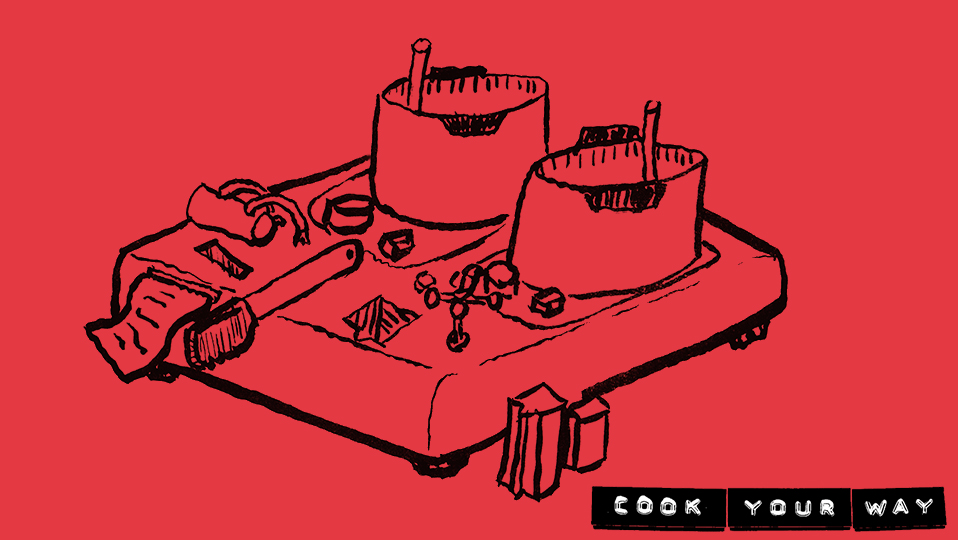I arrived in Canada in August 2018 to study for a PhD at Concordia University, and I was constantly thinking about and trying to navigate this new environment. My research, which is focused on alternative controllers and political game design, was completely entangled in this process. In September 2018, I joined the Reflective Game Design research group, directed by Rilla Khaled, in which a group of student researchers (Rebecca Goodine, Jess Rowan Marcotte, and Dietrich Squinkifer) developed different projects around how games can foster reflection. Cook Your Way started within that context, and the exchanges with my peers and research director were crucial to its development. The design strategies of questions over answers, clarity over stealth, disruption over comfort and reflection over immersion (more details here) were key to this process as they helped to solidify the game’s design and constantly open new questions.

Why a cooking game?
As the research group discussed and experimented with reflection in game design, I kept thinking back on the experiences of migrant friends and family, the situations they faced and impacts on their lives. There is quite a lot to unpack here, especially in how it relates to larger contexts and the repressive policies of different states, from charters of values, to acceptance certificates, to closed borders by “safe third country agreements”. I will be writing more about these topics soon.
In this complex mix, talking about food came to the foreground. It is no surprise that food is a social binding element. It is central to a sense of identity and closely intertwined with categories of belonging in ethnic identities. In migrant communities, the social and cultural practices around food production and consumption play important roles in the tensions and adaptations of the migration process (Epp 2015:48).
Ethnic foods can also become a shorthand for hosts fetishizing and commodifying migrant cultures. This is visible in shallow pro-immigration arguments such as “the more immigrants, the better the food.” (Sax 2017). In this commodified vision of multiculturalism, “ethnicity becomes spice, seasoning that can liven up the dull dish that is mainstream white culture” (hooks, 2006:366). Within capitalist multiculturalism, ethnicity can be marketed as cosmopolitan product and valued as social capital in global markets (Kymlicka 2013:109; Mitchell 2003). It narrates migrant trajectories in terms of entrepreneurship, strategic cosmopolitanism, and transnational commerce. It downplays economic redistribution, racial inequality, unemployment and labor rights (Kymlicka 2013:112).
I decided then to criticize this process, highlighting of crucial this process of cultural commodification is. For that I drewfrom media like cooking reality-shows which present cooking as individual narratives of success based on fitting-in and leveraging social capital to overcome a competitive marketplace. I decided to contrast that with preparing a Brazilian feijoada completa. This is a collective effort, imbued with tradition, symbolism, and frequently erased class, gender and racial antagonisms played out in its preparation and consumption (Fajans, 2012 :96-97).

Designing political alternative controllers
The game is very open about its political argument and sardonic humour, and the controller is central to that argument: the immigration judges in the game system are asking you to cook, but is that what you (as a player) are really doing? Is that how they are evaluating you? Where are you interacting with this device and under which conditions? Why is this labor of cooking so removed from the player? So, similarly to how the narrative and system stage an immigration process that feels a lot like a cooking reality show, the controller extends that to a cooking set that feels very much like an inadequate and commodified version of migrant foodways.
The alternative controller is aimed at constructing an embodied political critique, by mixing three different things: 1) a cooking play set / appliance, in which players’ gestures are an evocative and playful mimicking of cooking; 2) a border security device, like the automated photo booths and passport scanners found in airports; and 3 ) a language test center equipment with a banal but uncomfortable presence. The controller provides an experience of navigating the immigration bureaucracy in the game because it does not fit within a singular set of expectations. It mixes humour in its chaotic performance of cooking with the discomfort and disciplining that it is asking players to perform. In conventional controllers, transparency, black-boxing and mastery are design goals. The cooking station works to try and make these values strange and unfamiliar while also being a playful object.
References
Epp, Marlene. 2015. “Eating Across Borders: Reading Immigrant Cookbooks.” Histoire Sociale / Social History XLVIII (96): 22.
Fajans, Jane. 2012. Brazilian Food: Race, Class and Identity in Regional Cuisines. London ; New York: Berg.
hooks, bell. 2006. “Eating the Other: Desire and Resistance.” In Media and Cultural Studies: Keyworks, edited by Meenakshi Gigi Durham and Douglas Kellner, Rev. ed, 366–80. Keyworks in Cultural Studies 2. Malden, MA: Blackwell.
Khaled, Rilla. 2017. “Questions Over Answers: Reflective Game Design.” In Playful Disruption of Digital Media, 25. New York, NY: Springer Berlin Heidelberg.
Kymlicka, Will. 2013. “Neoliberal Multiculturalism.” In Social Resilience in the Neoliberal Era, 99–125. Cambridge: ambridge University Press.
Mitchell, Katharyne. 2003. “Educating the National Citizen in Neoliberal Times: From the Multicultural Self to the Strategic Cosmopolitan.” Transactions of the Institute of British Geographers 28 (4): 387–403. https://doi.org/10.1111/j.0020-2754.2003.00100.x.
